

Why "Choice Feminism" is an Illusion (With Bonus "Lost" Analogy) So I was looking at “Hot Chicks of Occupy Wall Street,” which is so blatantly sexist I got bored trying to write about it.
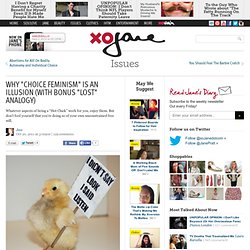
The site’s slogan is “The Sexy Side of Protesting Corruption,” but it might as well be “Come On Down, Boys, Some Boobs Are Here!” If you were concerned that people at the Occupy Wall Street protests might accidentally focus more on economic inequality than on whether they’d like to bang you, well, apparently you did not have to worry about that. On the front page currently is a note from one of the Hot Chicks. The women are not asked in advance whether they would like to be put in a Tumblr heralding their Hot Chickness -- many of them actually appear to have been photographed without their knowledge.
But one of them has spoken up, and she says she doesn’t mind being considered a Hot Chick. This got me thinking about the phenomenon of “choice feminism,” where women argue that even anti-feminist behaviors are feminist because “feminism is about choice.” They’re not. The Feminist Principle of Choice - Feminist Principles. The Feminist Principle of Choice The feminist principle of choice is central to the mandate of equality-seeking organizations.
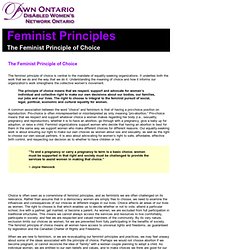
It underlies both the work that we do and the way that we do it. Understanding the meaning of choice and how it informs our organization’s work strengthens the collective women’s movement. The principle of choice means that we respect, support and advocate for women’s individual and collective right to make our own decisions about our bodies, our families, our jobs and our lives. The right to choose is integral to the feminist pursuit of social, legal, political, economic and cultural equality for women. A common association between the word “choice” and feminism is that of having a pro-choice position on reproduction.
Choice is often seen as a cornerstone of feminist principles, and as feminists we are often challenged on its relevance. Source: PACSW pdf document (requires Adobe Acrobat Reader) Choice is the Power of Feminism. This article originally appeared as a "First Person" column in the Emory Report on March 4, 1996 How many times have you heard someone say, "I'm not a feminist, but . . . . .
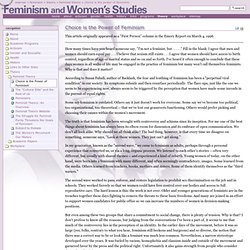
" Fill in the blank: I agree that men and women should earn equal pay . . . I believe that sexism still exists . . . I agree that women should have access to birth control, regardless of age or marital status and so on and so forth. I've heard it often enough to conclude that these days women in all walks of life may be engaged in the practice of feminism but many won't call themselves feminists. According to Susan Faludi, author of Backlash, the fear and loathing of feminism has been a "perpetual viral condition" in our society.
Some say feminism is outdated. The truth is that feminism has been wrought with controversy and schisms since its inception. In my generation, known as the "second wave," we came to feminism as adults, perhaps through a personal experience that converted us, or via a long, organic process. Where ‘Choice Feminism’ Has Got Us. Choice feminism, for those of you who haven’t been following along, is the name given to the idea that feminism equals women choosing what sort of life they want.
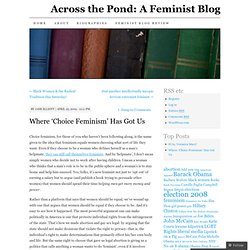
Even if they choose to be a woman who defines herself as a man’s helpmate, they can still call themselves feminists. And by ‘helpmate’, I don’t mean simply women who decide not to work after having children. I mean a woman who thinks that a man’s role is to be in the public sphere and a woman’s is to stay home and help him succeed. Yes, folks, it’s now feminist not just to ‘opt out’ of earning a salary but to argue (and publish a book trying to persuade other women) that women should spend their time helping men get more money and power .
Today, Some Feminists Hate the Word 'Choice' Burlesque And Empowerment. Photo by WeDo Photo I can’t even tell you how many times I started this essay.
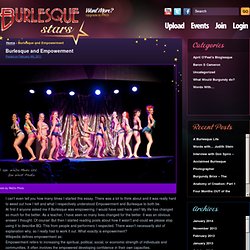
There was a lot to think about and it was really hard to weed out how I felt and what I respectively understood Empowerment and Burlesque to both be. At first if anyone asked me if Burlesque was empowering, I would have said heck yes!! My life has changed so much for the better. As a teacher, I have seen so many lives changed for the better. Wikipedia defines empowerment as: Empowerment refers to increasing the spiritual, political, social, or economic strength of individuals and communities. Conversely Marginalism as: Marginalized refers to the overt or covert trends within societies whereby those perceived as lacking desirable traits or deviating from the group norms tend to be excluded by wider society and ostracised as undesirables.